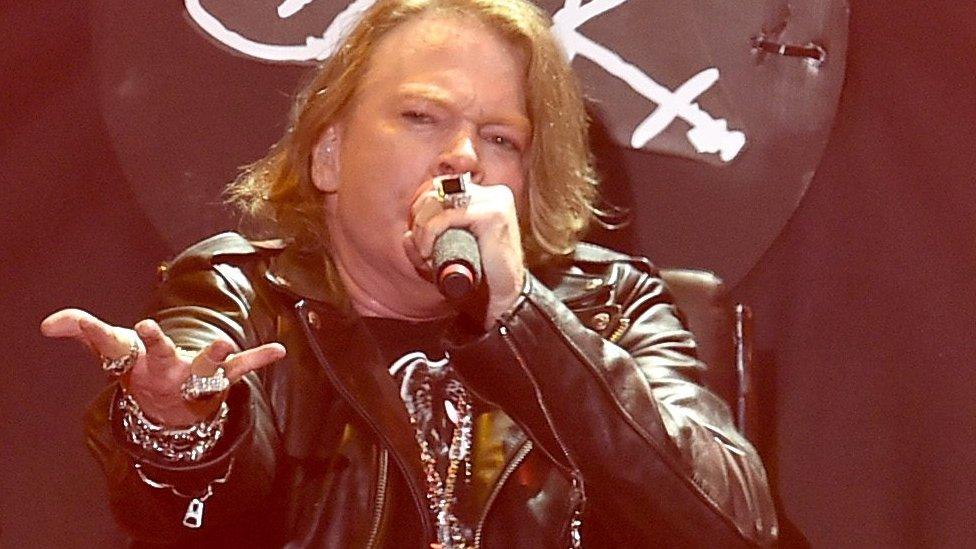AC/DC: 'We're too stubborn to change'
- Published
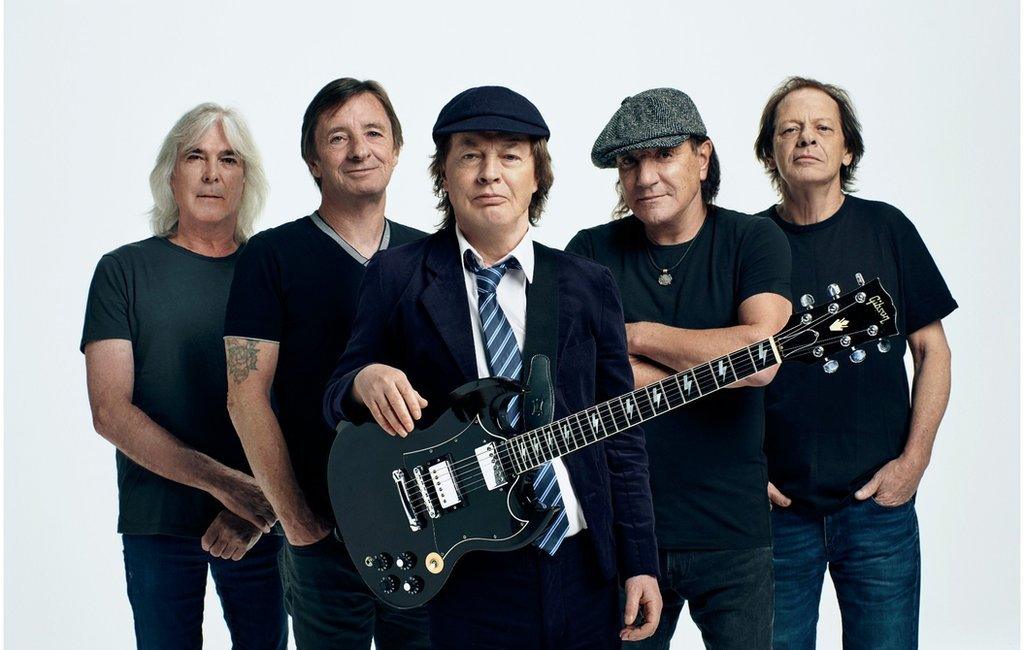
AC/DC in 2020 (L-R): Cliff Williams, Phil Rudd, Angus Young, Brian Johnson and Stevie Young
When AC/DC wrapped up their 88-date Rock Or Bust tour in Philadelphia four years ago, the band's future looked bleak.
Singer Brian Johnson had been replaced by Axl Rose for the last 23 shows, after doctors told him to stop touring or "risk immediate hearing loss". Rhythm guitarist Malcolm Young had retired, and was in the final throes of a battle with dementia. Drummer Phil Rudd had spent most of the previous year under house arrest in New Zealand after being charged with "attempting to procure a murder".
So, as he played the final chord of For Those About To Rock (We Salute You) at the Wells Fargo arena, founding member Angus Young assumed AC/DC were finished as a recording, touring rock band.
Perhaps the record company would suggest a compilation record or a box set, he thought, "but I didn't see another album."
At home in Sarasota, Florida, Johnson was feeling equally despondent as he faced an enforced retirement.
"It was a pretty lonely place to be," he says. "Suddenly, your family of workmates you've been with for 37 years [is] just gone and there's nothing to do.
"I buried my head in a bottle of whisky for a couple of months. It worked quite well."
But over the past four years, Young gradually and painstakingly put the band back together. Even Johnson was able to come back, thanks to some pioneering - and secretive - work to restore his hearing.
The result is AC/DC's 17th album, Power Up - an all-guns-blazing, kick-em-in-the-guts rock juggernaut that neither deviates from nor dilutes the band's time-tested formula.
"This is how we've always played and we don't stray from that," says Young.
"Maybe it's because we were stubborn but it's like, when I want to hear The Stones, I don't need The Stones trying to be a jazz band. We stuck to what we did best. We always found that our strength not our weakness."
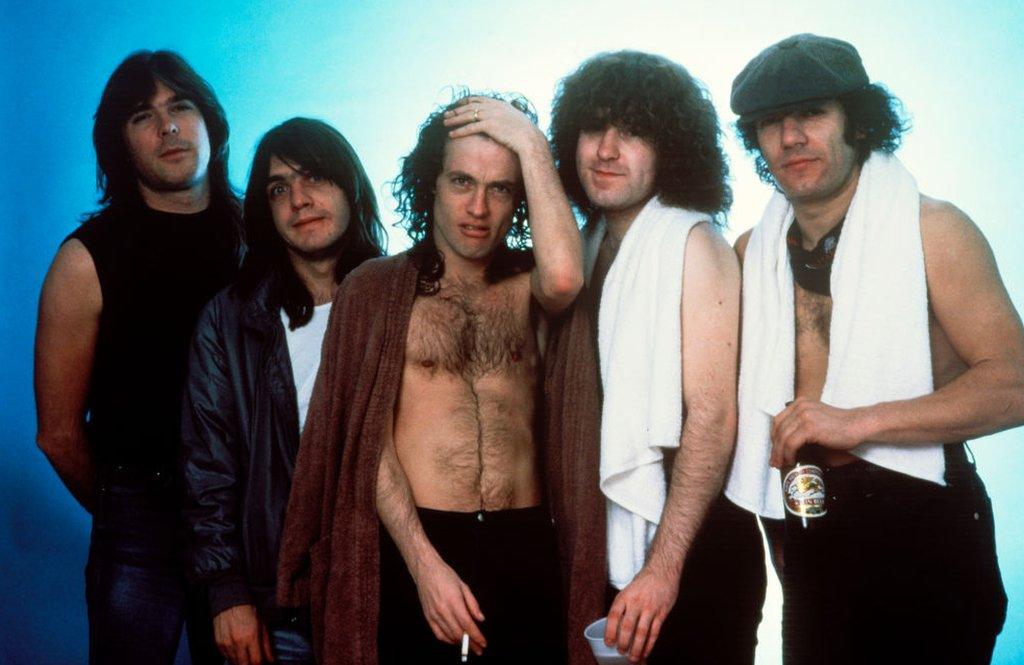
Malcolm Young (second left) was the band's main songwriter, alongside his brother Angus.
The album is dedicated to Malcolm Young, who died from the effects of dementia in 2017, and the guitarist is credited as a co-writer on every track - just as he had been on every AC/DC track since their 1975 debut High Voltage.
To create the record, Young went back and raided an archive of unreleased songs he'd written with his brother, mostly dating from the writing sessions for 2008's Black Ice.
"We'd had quite a long break in between Black Ice and the album previous [2000's Stiff Upper Lip], so there were a lot of years where me and Malcolm just worked on song ideas for AC/DC together," Young explains.
'Strong batch'
In fact, they'd written so much material that when it came to selecting the tracks that would go onto Black Ice, "we didn't even get past disc one".
Going back to those demos, Young discovered "a pretty good, solid collection" of songs. Some were complete, while others needed fleshing out.
"When me and him put together ideas, to get things rolling quickly we'd maybe do a verse and a chorus," Young explains. "On others, there wasn't much to do. Maybe change an intro or add a solo."
But once he had a "strong batch" of completed songs, Young faced another problem: He didn't have a band, much less a lead singer.
Johnson joined AC/DC in 1980, shortly after original singer Bon Scott died of alcohol poisoning. His first album with the band, Back In Black - dedicated to Scott's memory - became one of the best-selling albums in history, shifting more than 50 million copies worldwide.
But in the middle of the Rock Or Bust tour, he began to have difficulties hearing.
"I was not getting through the set," he says. "My ears would be gone by about 45, 50 minutes and I couldn't hear the guitars. It was just monotone. Dreadful, dreadful for a singer."
Most fans didn't notice. Johnson says he got through the shows on muscle memory - but Young acknowledges it was "a hell of a struggle for him towards the end".
The band could have stopped altogether, but Young says cancelling the tour would have involved "a lot of legal things" - not to mention laying off a tour crew of almost 90 peopole.
Then, out of the blue, Guns N' Roses star Axl Rose called to offer his services.
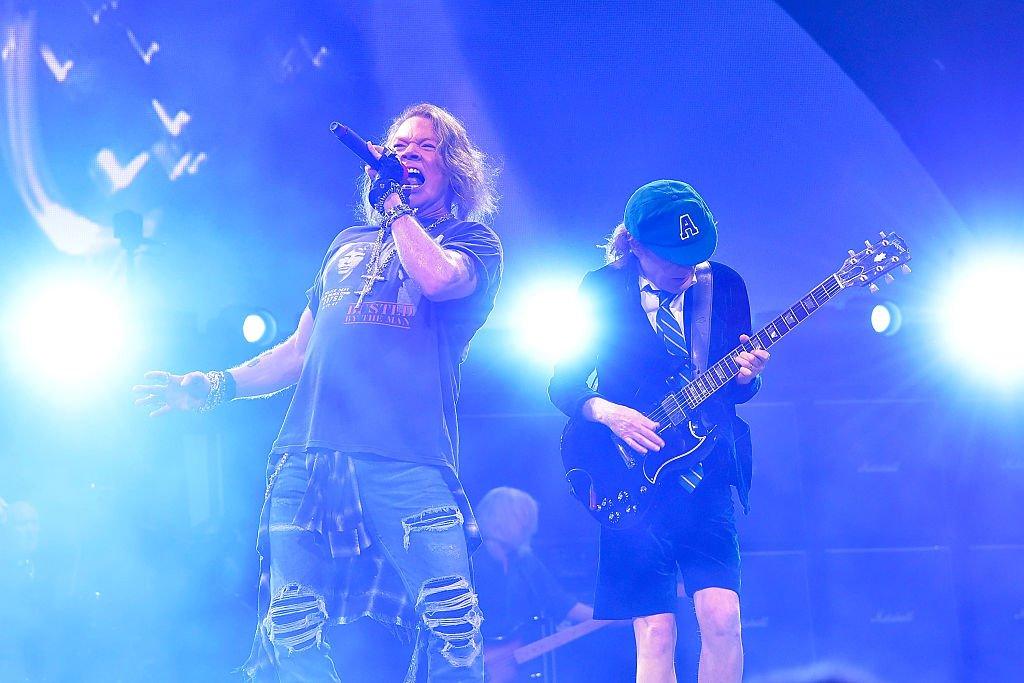
Axl Rose played 23 dates with AC/DC in 2016
"We were really grateful because he gave it his best shot and he helped us get through and finish those dates," says Young.
But Rose was never going to become a permanent member of the band. And when the tour ended, bassist Cliff Williams announced his intention to retire, having suffered from "terrible vertigo" on the road.
Unbeknownst to the others, however, Johnson had met with audio expert Stephen Ambrose, who said he could help resolve the singer's hearing problems.
Ambrose, who invented the wireless in-ear monitors that are widely used by touring artists today, claimed to have invented a new type of ear-bud that would allow Johnson to perform without causing further damage to his eardrums.
It took three years of experiments, but Johnson says the technology could allow him to tour again.
"I'm under a non-disclosure agreement so I can't say too much," he says, "but if I said to you it's a prosthetic eardrum, you'd be getting somewhere near the truth."
The innovation paved the way for Johnson's return to the band. But the singer says it was Malcolm who really brought them together.
"Even though Malcolm is no longer with us, he was a strong character in life and he [still] hasn't given up, let's put it that way," he says. "We're not spiritualists or anything, but he's there."
Rudd to redemption
Fittingly, the band first reunited at Malcolm's funeral in Australia in 2017. "There was this unspoken bond, trust, when we were all sitting there," says Johnson. "And I think that might have sparked it"
By that stage, Rudd had put his legal troubles behind him, after pleading guilty to charges of drug possession and threatening to kill an employee - in what he maintained was an episode of methamphetamine psychosis.
Today, Young says the drummer is "in good shape and has sorted out a lot of his problems".
"He put all that horrible nonsense he went through in the past," agrees Johnson.
The band, who refused to tour with Rudd in 2015, welcomed him back into the fold. Once the old gang were back together, Williams didn't take much convincing to retire from retirement.
AC/DC reconvened in Vancouver in summer 2018 with producer Brendan O'Brien.
"We wanted to do it in secret in case nothing came of it," Johnson recalls, "and of course somebody took photographs when we were having a sneaky cigarette on the fire steps outside the studio."
After erecting an umbrella to stop the paparazzi taking further shots, the band hit their stride in the studio.
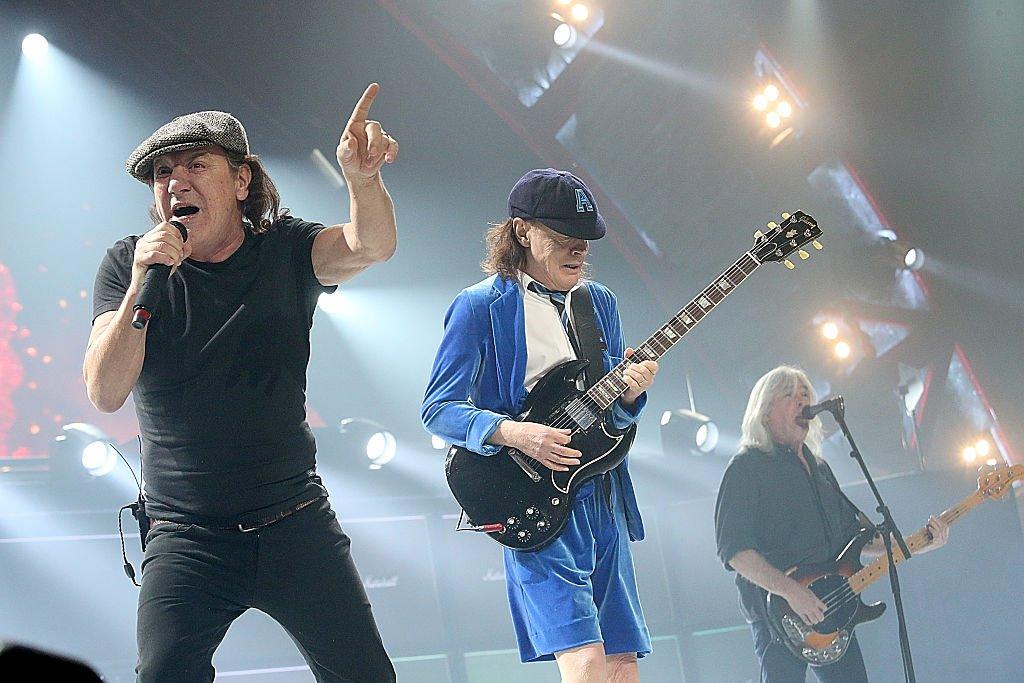
The band say they are itching to tour again once coronavirus restrictions are lifted
The third song they recorded was Shot In The Dark - all swaggering blues riffs and rib-shaking drums - which was destined to become their comeback single.
Most importantly, Johnson's vocals were in full flight.
"He was hitting every note," marvels Young. "He was hitting notes there that he hadn't hit at other times."
The band were keenly aware, however, that this was the first album they were making without Malcolm.
"We felt him all around," says Johnson. "Angus felt it more than anybody because they were brothers. He used to say, 'I'm having a conversation with Malcolm in my head before I put the song down,' just to make sure it would have passed muster."
It would have been easy to include some of Malcolm's recordings on the album itself - lifting riffs or hooks from the original demo tapes - but Angus felt that would have been disrespectful.
"His actual guitar? I chose consciously not to do that. Malcolm was his own unique style and I didn't want to start chopping up pieces.
"I know they have the tools these days to do it, but he wouldn't be a fan of that. He would want it to be one solid take. And being his brother, I would feel a bit strange doing that way."
Lyrically, the album is still littered with the silly puns and double-entendres fans have come to expect - but there's also space for reflection on a track called Through The Mists Of Time.
"See dark shadows / On the walls / See the pictures / Some hang, some fall," sings Johnson, who says the song is an "ode to happy times of rock and roll when we were young and daft".
"I just see Malcolm in my mind every time I hear it being played," he adds.
'Full battle conditions'
Singing in the controlled environment of a recording studio is one thing, but playing live is a different beast - and a question remained over whether AC/DC could tour once the album was complete. They got their answer in Holland at the start of this year.
Officially, the band were there to film a video for Shot In The Dark, but Young had other ideas. He suggested setting up for a full rehearsal, just to see if it could be done.
"He was throwin' us a lifeline," says Johnson in his distinctive Geordie brogue.
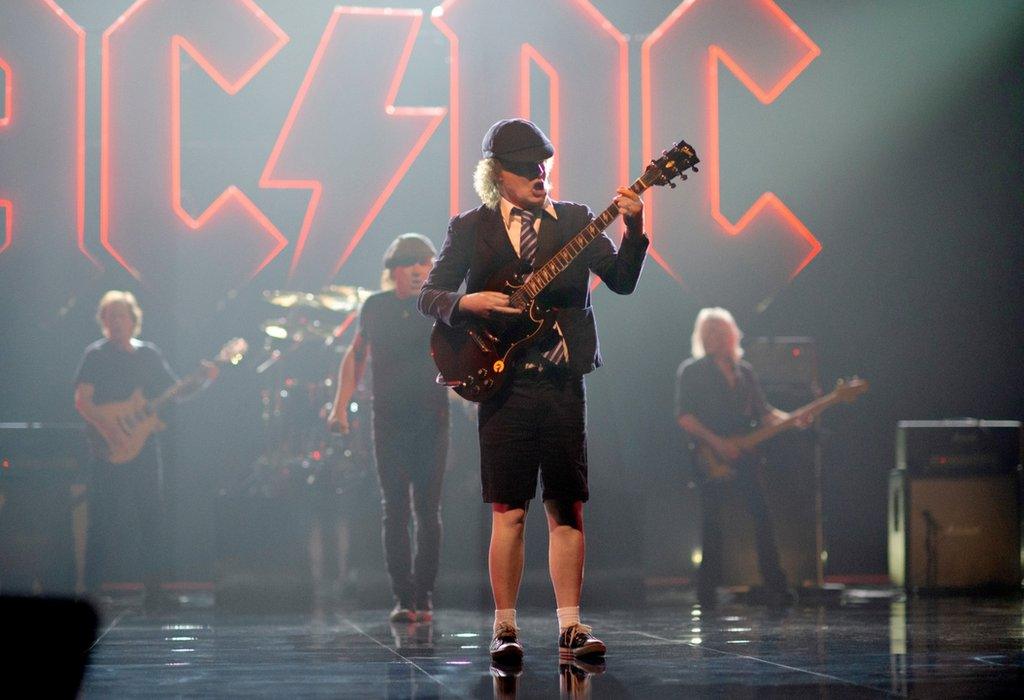
The band have sold more than 200 million records over the course of their career.
"The band said, 'Should we start off quietly?' and I said, 'No Angus. I want full battlefield conditions… How's about Back In Black?' Just about the toughest thing you can sing. And we did it, and then we did Shoot To Thrill, and we never stopped for 15 days.
"And, oh boy, the smiles on everybody's faces. We knew it was cookin'. It really was cookin' and we were just so happy. Happier than anyone deserves to be.
"For me, it was just a big, big day when I heard that. I could hear everything and I just went, 'Oh my God.' It was a miracle."
A few days later fate, in the shape of coronavirus, intervened. Any dreams of going on tour were immediately shelved; and the band are still unsure if they'll make it back on the road.
"I dream of it, to be quite honest with you," says Johnson. "That feeling of when somebody says, 'You're on'. I can only imagine what that will be like."
"I hope I can stay fit and healthy. I hope the people, the audiences, can get back together again and feel safe, and just let it all out.
"Because once that thing [Covid] is gone, the enthusiasm is going to be fantastic. And I want to be there when it happens."
Power Up is out on Friday.

Follow us on Facebook, external, or on Twitter @BBCNewsEnts, external. If you have a story suggestion email entertainment.news@bbc.co.uk, external.
- Published18 November 2017
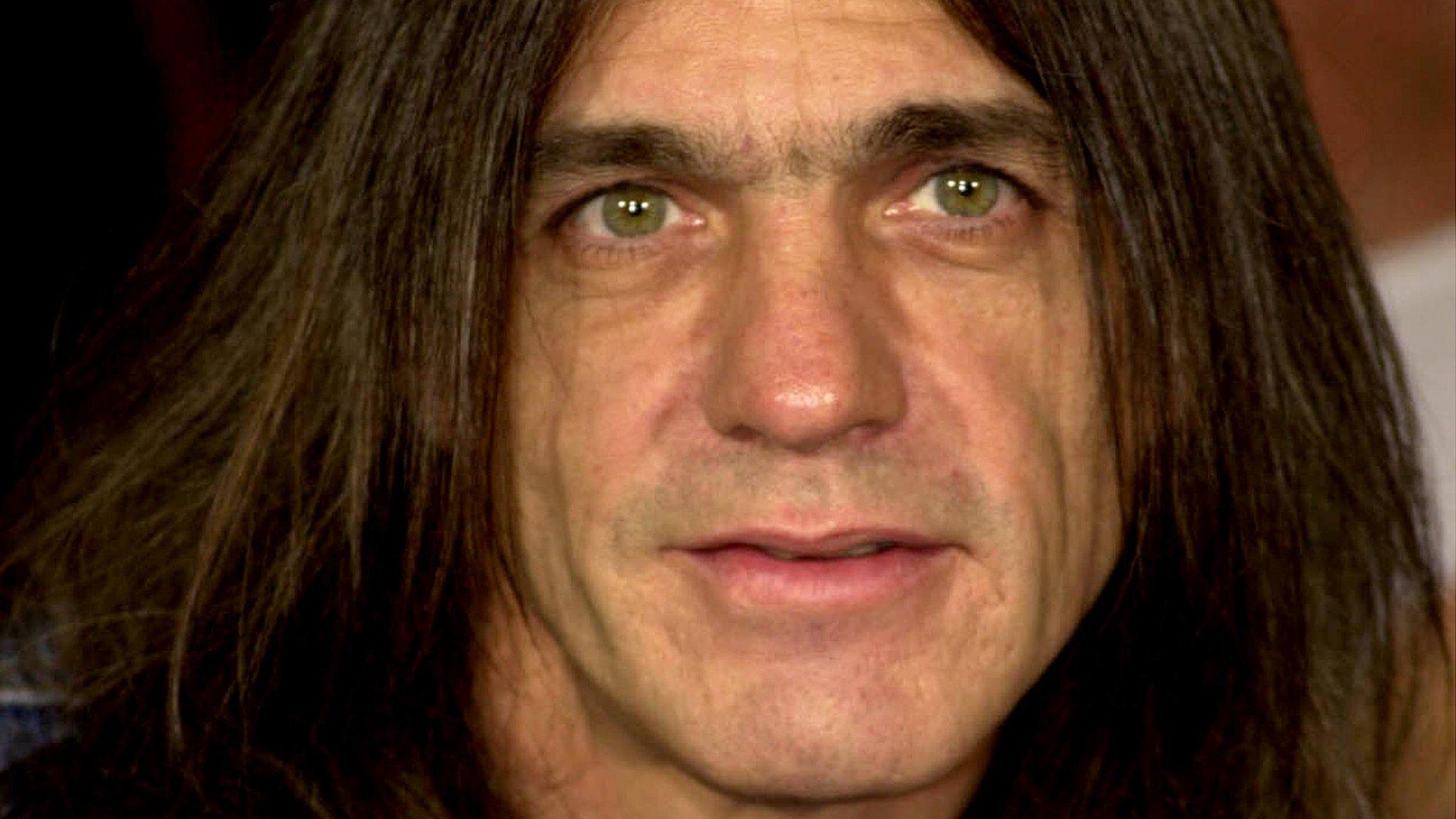
- Published8 March 2016
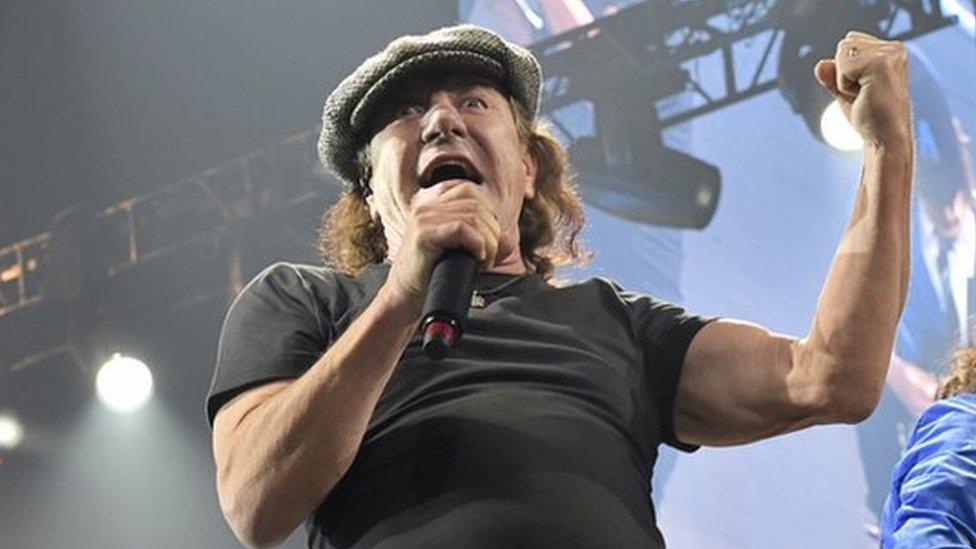
- Published5 May 2016
